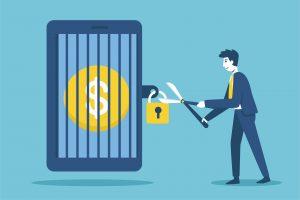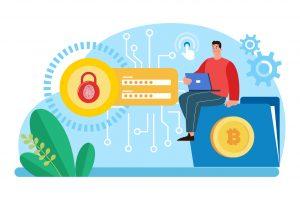Assets are valuable. It takes much effort to acquire and sustain them. We always ensure that our assets, like gold, real estate, and financial securities, are safe and secure. The question is, what happens when we are not around? Who takes care of them? Just as we are assigning beneficiary for these assets, it becomes essential that we assign a Crypto beneficiary to our crypto assets.
Who is a Crypto beneficiary? And why do we need them? This article will dive into all the dimensions related to a crypto beneficiary, how to choose them, and the way forward.
What are Crypto Assets?
Crypto assets are generally a subset of digital assets that include cryptocurrencies and NFTs, represent value and can be exchanged, traded, stored electronically. These digital assets operate on blockchain technology and cryptography. They are neither managed by a central bank nor regulated by the government. Also, they are capable of providing excellent value but, at the same time, involve risks too.
Types of Crypto Assets
Different types of cryptocurrency and crypto assets exist in the market. They can be broadly categorized under the following categories.
Cryptocurrency
It is the most popular form of crypto asset. Cryptocurrency is a digital currency that uses technologies like cryptography or encryption algorithms to secure and verify transactions. It has a perceived value based on demand and supply in the market rather than an inherent value. Moreover, it is decentralized, i.e., not issued by any government/central bank. The first cryptocurrency was eCash by a company called DigiCash in 1990. Examples of market crypto currency include Bitcoin, Libra, Ether, and LiteCoin.
Utility Tokens
This token is issued when a new company/start-up needs financial support. It acts as an incentive to the investors if they don’t get a stake in the company. Let’s suppose the company becomes successful. In this opportunity, the investors can use the utility coupon to access the company’s project or buy products and services.
Security Tokens
Unlike Utility Tokens, Security Tokens are investment assets. When a company needs financial support, it floats bonds, stocks, and securities in the financial market. Similarly, Security Tokens are securities in digital form. They are issued to investors to take a stake of ownership or buy shares (in this case, security tokens) of that company.
Non-Fungible Tokens
Fungible tokens like physical or cryptocurrency are equivalently replaced, traded, or exchanged. When it comes to Non Fungible Tokens, they can’t be replaced, traded, or exchanged because of their unique value. Just like cryptocurrencies are bought to exchange currency, NFTs can be bought to buy collectibles. For example, songs, images, and artworks.
Other types of crypto currency and assets are emerging, and one needs to ponder what happens to the assets when a person passes away without assigning beneficiaries in their will or Digital assets planning.
What are the Beneficiaries of Crypto Assets?
All the hard-earned assets stay here and don’t come with us when we leave this world. All the traditional savings in our bank accounts are passed down to a beneficiary one day. We have seen that traditional assets like cars, houses, and gold require a well-drafted Will or Estate Plan, but crypto assets have technical risks if any password, code, or digital pattern is forgotten or lost. The process is even more cumbersome if no beneficiary gets nominated for the asset.
Crypto Beneficiaries are people in our family, our trustworthy friends, relatives, and extended family. They can be provided with all the necessary information about the wallet in which crypto assets are stored, how they are kept, and how to access them. Making a list of Crypto Beneficiaries in terms of future requirements, rightful terms, and clear instructions is necessary for the smooth distribution of assets.
Like paper currency, a crypto asset is stored in a wallet. The wallet is of 2 types, Hot Wallet and Cold Wallet.
Hot Wallet
This wallet is accessible online, which needs an internet connection. It facilitates virtual currency transactions between two parties. Moreover, it is a web-based mobile wallet that is easy to use and fosters quicker payments.
Cold Wallet
This is a physical wallet. It is a hardware wallet that is safe from online threats and is better suited for long-term crypto amounts and future asset planning. The Cold Wallet needs to be kept securely but traceable where you can track it. Keep the wallet separate from the key. If both are kept together, they can be stolen, and one can, unfortunately, lose them forever.
It is advised that wallets are safe and risks are prevented in case of robbery and hacking. A considerable loss needs to be avoided at all costs. The wallet has a password or a key that has to be safely applied, remembered, and in some rare cases, restored. If a repeated key trial is made, the wallet and its assets can be lost forever and become irretrievable to gain access.
Some crypto exchanges in the market, like Coinbase, don’t have beneficiary assigning services for the crypto asset accounts as any banking institution. Also, FTX requires a court order for rightful ownership. It involves stressful paperwork and court proceedings to receive those assets. The beneficiary designation for cryptocurrency is still new. It is undoubtedly on the crypto asset holders and the market to voice this.
How to Choose Beneficiaries for Crypto Assets?
A beneficiary can be a friend, family member, spouse, child, organization, or group of people. Usually, there are primary beneficiaries and contingent beneficiaries. Primary beneficiaries are people we decide, and Contingent beneficiaries are those who come second in line if any primary beneficiary dies.
Assigning a beneficiary is like creating a trust, i.e., a Crypto trust wherein we, as a trustor give the right to hold crypto assets to a trustee or beneficiary.
Thus, crypto asset holders can follow criteria to assign beneficiaries. Things like
- Marital status
- Dependence of family members
- Having children
- Choice of extended family
- Level of trust factor/status of relations
- Knowledge about crypto assets and their functions
Benefits of Assigning a Beneficiary
It is seen that when we have traditional assets like savings accounts, they are duly saved by the bank and ask for the beneficiary to be assigned. When people pass away, their families and children can’t access the money in the account if they have little idea about the accounts opened, the beneficiaries assigned, and an absence of a list of instructions by the posthumous account holder. The associated family is then entangled in several legal battles and procedures.
A sense of peace of mind is derived when beneficiaries are assigned. It puts much stress aside for the heirs as crypto assets can be enormous investments and hold substantial worth. Also, when we go through a significant life change, it makes us wonder who and what holds importance in life. Moreover, it gives us the power to choose and decide who gets access to the crypto assets instead of family fights and decisions of others to rule out.
We can create a legacy of crypto assets to be passed on to the coming generation. Assigning beneficiaries becomes a task and leads to the involvement of many organizations that create an entire ecosystem to handle crypto from the start till the end.
Conclusion
Therefore, the future of cryptocurrency and crypto assets is expansive and dynamic. Decisions like deciding on beneficiaries show the far-sightedness and vision of a person to deal with challenges. Safety of assets is the way to go and secure the future of your loved ones. Hence, Assigning beneficiaries for crypto assets and a step-by-step process with the required information in the crypto real estate plan is essential.






